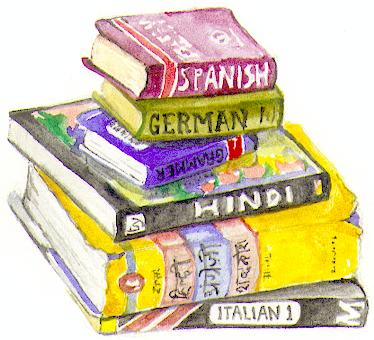
French as a Second Language
French is not only one of
Canada’s two official languages, but is also widely used around the world. The
aim of the FSL curriculum is to prepare students to perform effectively in the
challenging world they will face by providing them with the skills they will
need to communicate in a second language. Students will be able to choose from
courses that lead to study at the postsecondary level or to the workplace,
depending on their individual interests, strengths, and aspirations.
The FSL curriculum
comprises two programs:
Core French
The aim of the Core French
program is to provide students with fundamental communication skills in French
and an understanding of the nature of the language and its culture. By the end
of the four-year program, students will be able to participate in a
straightforward conversation in French; will be able to read – with the help of
a dictionary – books, magazines, and newspapers in French; and will be able to
understand the general meaning of radio and television news and other programs.
French Immersion.
The aim of the French Immersion program is to
develop and refine students’ ability to communicate in French as well as to
expand their knowledge of the language through the study of francophone
literature. By the end of the four-year program, students will participate in
conversations and discussions; will be able to take courses at the college or
university level in which French is the language of instruction; and will be
able to accept employment in which French is the working language.
English as a Second Language
Ontario secondary schools are now home to students who speak more than 100 different languages. Ontario's increasing linguistic and cultural diversity provides students with many opportunities for cultural enrichment and for learning that is global in scope. This diversity, however, means that a significant and growing proportion of Ontario students arrive in English-language schools as English language learners – that is, students who are learning the language of instruction at the same time as they are learning the curriculum. The curriculum in English as a Second Language and English Literacy Development for Grades 9 to 12 has been developed to ensure that English language learners have the maximum opportunity to become proficient in English and achieve the high levels of literacy that are expected of all Ontario students.
The goals of the ESL curriculum
The ESL curriculum is based on the belief that broad proficiency in English is essential to students' success in both their social and academic lives, and to their ability to take their place in society as responsible and productive citizens. The curriculum is designed to provide English language learners with the knowledge and skills they need to achieve these goals. Its aim is to help students become successful English language learners who can:
• use English to communicate effectively in a variety of social settings;
• use English to achieve academically in all subject areas;
• take charge of their own learning, independently and in groups;
• select and use effective learning strategies;
• integrate confidently into mainstream courses;
• use English effectively to advocate for themselves in all areas of their lives;
• make a successful transition to their chosen postsecondary destination (work, apprenticeship, college, university);
• function effectively in a society increasingly committed to the use of information technology;
• use critical-literacy and critical-thinking skills to interpret the world around them;
• participate fully in the social, economic, political, and cultural life of their communities and of Canada.
Teachers
Ms. Polina Tchatsi
Mr. Michael Nakhla
email: michael.nakhla@yrdsb.ca
Ms. Sandra Vig
email: sandra.vig-dinescu@yrdsb.ca
Ms. Maha Azim
email: maha.azim@yrdsb.ca
Ms. Shayna Blumenthal
email: shayna.blumenthal@yrdsb.ca